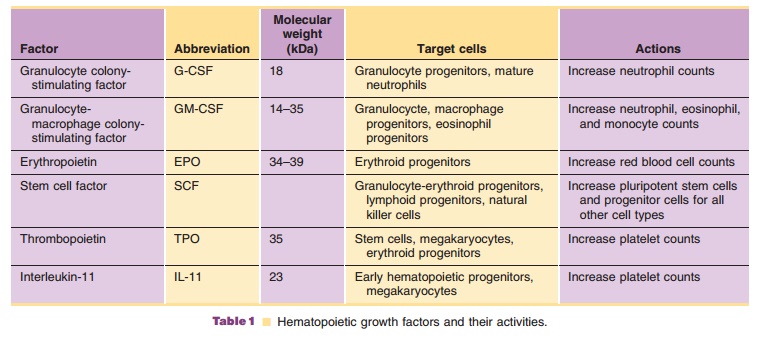Chapter: Pharmaceutical Biotechnology: Fundamentals and Applications : Hematopoietic Growth Factors
Chemical Description of Hematopoietic Growth Factors
CHEMICAL DESCRIPTION OF HEMATOPOIETIC GROWTH FACTORS
Hematopoietic growth factors are generally glycopro-teins, which can be
distinguished by their amino acid sequence and glycosylation pattern
(carbohydrate linkages). The recombinant HGFs, however, are not always
glycoproteins. In spite of the lack of the carbohydrate moieties, they may
still assume the structure necessary to exert the same biologic activity of the
glycosylated form. In some cases, however, additional carbohydrates have been
engineered and added to the native CSF to increase circulating half-life. Most
HGFs are single-chain polypeptides. The carbohydrate content varies by growth
factor and production method, which in turn affects the mole-cular weight but
not necessarily the biologic activity.
Each HGF is encoded by a specific gene. Production of the recombinant
proteins is accom-plished by first identifying the gene in question, isolating
it by various techniques, inserting the gene of interest into a plasmid, and
then expressing the protein of interest in a biologic system (e.g., bacteria,
yeast, or mammalian cells) to produce recombinant growth factors.
The HGFs that will be discussed in detail include:
·
the white cell factors factors,
granulocyte colony-stimulating factor (G-CSF) and granulocyte-
·
macrophage colony-stimulating
factor (GM-CSF);
·
the red cell factors, the erythropoietins (EPO) and
·
darbepoetin alfa;
·
the platelet factors, thrombopoietin
(TPO), mega-karyocyte growth and development factor (MGDF),
·
and interleukin-11 (IL-11); and
·
an early acting HGF, stem cell factor (SCF).
A summary of the HGFs and their activities is provided in Table 1.

Related Topics